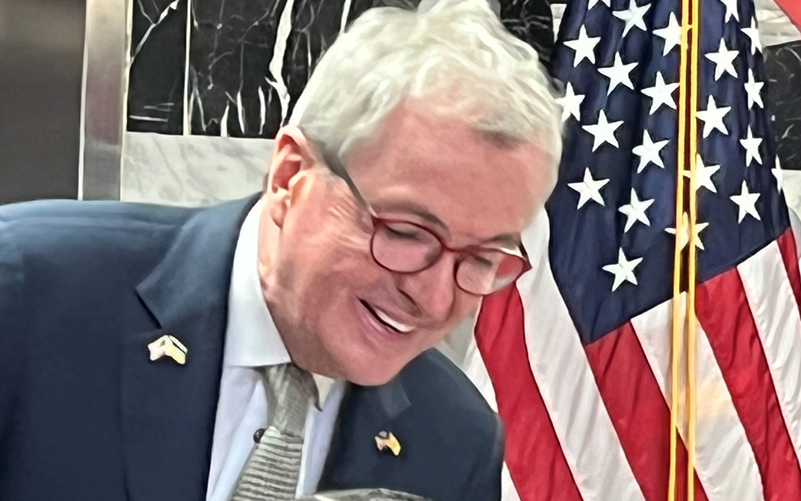
Phil Murphy was quoted in a Sunday Star-Ledger story as saying he doesn’t think about his legacy.
He probably doesn’t, but how an elected official – like a governor – is remembered is going to happen anyway.
The story in question focused on the governor’s signing earlier this month of the so-called Open Public Records Act reform bill. Like many other observers, it was noted that the governor’s weakening of public access runs counter to some of his genuine liberal tendencies.
After all, he’s the governor who championed driver’s licenses for the undocumented, off-shore wind initiatives, more gun restrictions and also the guy who marched in a 2020 George Floyd protest in defiance of his own pandemic restrictions.
You do get the feeling that Murphy senses the discrepancy as well.
In signing legislation that will change the 20-year-old OPRA law, and in effect, make it harder for average people to find out what their government is doing, the governor practically apologized.
Really.
His lengthy statement acknowledged the criticism by many advocacy groups – groups that ordinarily support the governor – but then reviewed all the good things he has done to promote transparency and good government.
Let’s see.
He questioned Economic Development Authority tax incentives because of alleged political interference.
He expanded voter rights by instituting early voting and made it easier to vote by mail.
And he called for Bob Menendez’ resignation as soon as he got indicted last fall.
All true. But it seems to miss the point.
As mentioned previously here, the bottom line goal of this reform legislation is to make it harder for people to get public information. The bill was changed from its original version, but – nuances aside – the overriding goal did not change.
We must again come back to a line in the bill that says a public agency may deny disclosing personal information if it “has reason to believe” that disclosure of such information may result in harassment.
Since just about any information can lead to someone being “harassed,” that is a massive loophole and one bureaucrats will use. Just watch them.
It was striking that during the debate on the bill, Assemblywoman Victoria Flynn, a Republican co-sponsor, spoke about how hard OPRA was making it for some municipal clerks to do their job. OK. But isn’t providing the public with information a big part of their job?
Within Murphy’s five-page statement, a few sentences stood out.
Here was one of them:
“Over a hundred mayors from both parties have asked for it to be enacted into law. I understand that some may view this support cynically, but I do not believe it is fair to dismiss an overwhelming bipartisan consensus from local elected officials.”
There is a very good reason to view that support cynically. Many mayors – not because they are evil people – enjoy keeping the public in the dark as much as possible. It’s just the way politics is played.
We digress. I ran into a former mayor a few weeks ago, and when I asked him about OPRA, he said he wishes it would go away. He meant the whole concept, not the reform bill.
So, obviously mayors are going to want OPRA to be scaled back. What Murphy ignores is the simple fact that the idea of OPRA was not to please elected officials, but to help the general taxpayer.
Flynn’s comments are in the same ballpark. It’s more important to think of municipal employees than it is the general public.
Murphy noted that mayors “subject themselves to constant scrutiny …”
Of course. It’s part of the job. Don’t run if you don’t like it.
One more thing. Let’s keep in mind that these changes to OPRA have been a very bipartisan accomplishment.
In this case, that’s a negative.
And there’s no reason to be cynical, of course, but the bill was signed the day after the primary election.
(Visited 19 times, 19 visits today)
Murphy’s Seismic OPRA Bellyflop in Insider NJ: A Closer Look
Recently, Governor Phil Murphy made headlines in Insider NJ with his controversial decision to deny a request for seismic testing data under the Open Public Records Act (OPRA). This move has sparked debate among environmentalists, government transparency advocates, and the general public.
The request for seismic testing data was made by a group of concerned citizens who wanted to access information about potential seismic activity in New Jersey. This data is crucial for understanding the risks associated with earthquakes and other natural disasters in the state.
However, Governor Murphy’s denial of the request has raised questions about his commitment to transparency and accountability. Some critics argue that his decision to withhold this information goes against the principles of open government and could potentially put residents at risk.
On the other hand, supporters of the Governor defend his decision, citing concerns about national security and the need to protect sensitive information. They argue that releasing seismic testing data could compromise the state’s security and jeopardize ongoing investigations.
Despite the controversy surrounding Murphy’s decision, it is important to consider the broader implications of denying access to public records. Transparency is a fundamental principle of democracy, and citizens have a right to access information that affects their safety and well-being.
Moving forward, it will be crucial for Governor Murphy to address concerns about transparency and accountability in his administration. By engaging with stakeholders and promoting open dialogue, he can work towards rebuilding trust with the public and ensuring that decisions are made in the best interest of all New Jersey residents.
In conclusion, the denial of seismic testing data under OPRA by Governor Murphy has sparked a heated debate about government transparency and accountability. As this issue continues to unfold, it is important for all stakeholders to engage in constructive dialogue and work towards finding a solution that prioritizes the safety and well-being of New Jersey residents.



